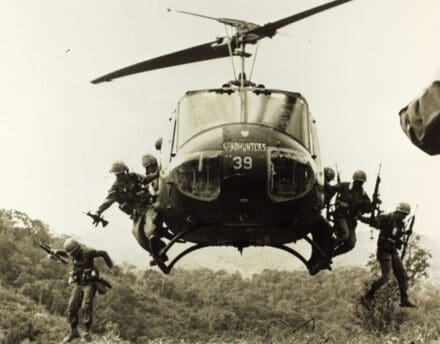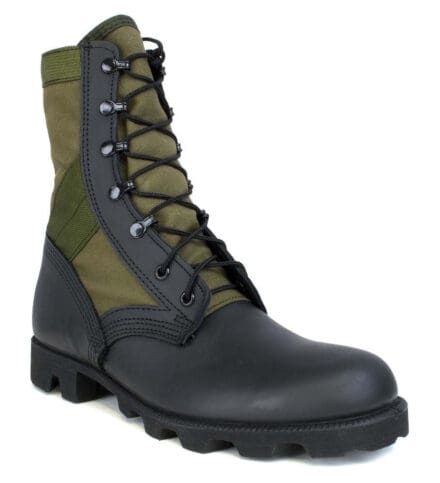Crafting combat footwear for the Vietnam War
> American troops in the Vietnam War needed a better combat boot.
The year was 1967, and the Vietnam War raged on. With half a million American troops in South Vietnam, the U.S. was at the height of its combat operations.
One major challenge? The standard, all-leather boot issued to troops was falling apart. As America’s warfighters trudged through the dense bamboo, razor-sharp grass, and perilous swamps of southeast Asia, the stitching on their boots was rotting. The federal government sought a more reliable construction to withstand the hot, wet, and humid conditions troops encountered every day.

A shoemaker’s mission: Combat boots that prevailed in the hot, harsh jungle.
“When lives are on the line – as they were every day in the Vietnam War – no gear is more critical than durable combat boots.”
– Jim McRae, Vice President, Director, and Secretary, McRae Industries
Changing course

Responding to the call: McRae Footwear got its start as a government contractor by making boots for American troops in Vietnam.
More than 9,000 miles away from Vietnam, in tiny Mount Gilead, NC, a children’s shoe company had a solution to the military’s boot problem. Gro-Rite Shoes built its footwear following “Process 82.” Instead of the standard practice of stitching on soles by using the welt construction, rubber outsoles were molded directly onto the leather, yielding a highly functional and long-lasting boot.
Responding to the call: McRae Footwear got its start as a government contractor by making boots for American troops in Vietnam.

Functional and long-lasting: McRae’s olive drab jungle boot.
The U.S. Department of Defense asked Gro-Rite to consider producing combat boots for the Vietnam War. The company bid on and was awarded its first federal contract. The product: olive drab jungle boots, with a hunter-green canvas upper section and thick black rubber outsole.
The war order secured, the company changed its name to McRae Footwear and swiftly exited the children’s shoe business. Although McRae shared the jungle boot contract with 13 other government suppliers, work was plentiful. Jungle boot construction continued steadily in Mount Gilead until 1973, when U.S. troops left Vietnam.
Building a relationship with the federal government
“The military boot business was a huge change for us,” says Jim McRae, vice president, director, and secretary of McRae Industries. “We had the equipment and we had the knowledge, but we needed to learn about government specifications and the ins and outs of being a government contractor.”
Sparked by the abiding tenacity of company founder Branson McRae, the company continued making military boots of various designs for the government using the vulcanizing/direct molded sole construction. Over the years, McRae has emerged as a trusted supplier of military boots.
The jungle boots were so successful that they remained a military-spec item until the mid-1990s. McRae still manufactures commercial versions of these boots using the same vulcanizing presses and molds from the Vietnam War era. Today’s boot is constructed of green canvas-colored nylon Cordura for light weight and maximum airflow.
“The Vietnam War had a huge impact on our nation,” Jim says. “It also had a huge impact on our family business. We started bidding for government contracts, and we have been fortunate ever since to continuously win government work.”


Question for some of the more boot-literate folks on here- why doesn’t the tread pattern from jungle boots (or really, any similar lugged sole) show up much on modern combat boots?
It seems like a design that does a good job of maximizing useful sole life while still providing traction and remaining flexible.
Army hates it. Marine Corps loves it. New Marine issue hot weather boot has Panama tread.